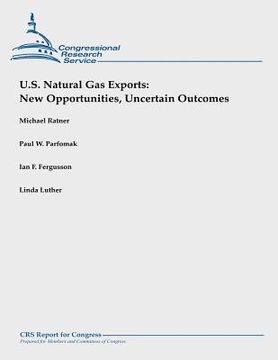U.S. Natural Gas Exports: New Opportunities, Uncertain Outcomes
Synopsis "U.S. Natural Gas Exports: New Opportunities, Uncertain Outcomes"
As estimates for the amount of U.S. natural gas resources have grown, so have the prospects of rising U.S. natural gas exports. The United States is expected to go from a net importer of natural gas to a net exporter by 2020. Projects to export liquefied natural gas (LNG) by tanker ship have been proposed-cumulatively accounting for about 12.5% of current U.S. natural gas production-and are at varying stages of regulatory approval. Projects require federal approval under Section 3 of the Natural Gas Act (15 U.S.C. 717b), with the U.S. Department of Energy's Office of Fossil Energy and the Federal Energy Regulatory Commission being the lead authorizing agencies. Pipeline exports, which accounted for 94% of all exports of U.S. produced natural gas in 2010, are also likely to rise. What effect exporting natural gas will have on U.S. prices is the central question in the debate over whether to export. A significant rise in U.S. natural gas exports would likely put upwards pressure on domestic prices, but the magnitude of any rise is currently unclear. There are numerous factors that will affect prices: export volumes, economic growth, differences in local markets, and government regulations, among others. With today's natural gas prices relatively low compared to global prices and historically low for the United States, producers are looking for new markets for their natural gas. Producers contend that increased exports will not raise prices significantly as there is ample supply to meet domestic demand, and there will be the added benefits of increased revenues, trade, and jobs, and less flaring. Consumers of natural gas, who are being helped by the low prices, fear prices will rise if natural gas is exported. Electric power generation represents potentially the greatest increase in natural gas consumption in the U.S. economy, primarily for environmental reasons. Natural gas emits much less carbon dioxide and other pollutants than coal when combusted. Other types of consumption are not likely to increase natural gas demand domestically for a long time. Use in the transportation sector to displace oil is likely to be small because expensive new infrastructure and technologies would be required. There is discussion of a possible revival of the U.S. petrochemicals sector, but the potential extent of a change is unclear. Getting natural gas to markets where it can be consumed, whether domestically or internationally, may be the industry's biggest challenge. Infrastructure constraints, environmental regulations, and other factors will influence how the market adjusts to balance supply and demand. Environmental groups are split regarding natural gas use, with some favoring increased use to curb emissions of certain pollutants, while others oppose expanded use of natural gas because it is not as clean as renewable forms of energy, such as wind or solar. The use of hydraulic fracturing to produce shale gas has also raised concerns among environmental groups particularly concerned with its possible impacts on water quality. The possibility of a significant increase in U.S. natural gas exports will factor into ongoing debates on the economy, energy independence, climate change, and energy security. As the proposed projects continue to develop, policymakers are likely to receive more inquiries about these projects. Proposals to expedite and expand LNG exports have already been raised in the 113th Congress, including in S. 192 and H.R. 580. Two other bills, H.R. 1189 and H.R. 1191, would reform the DOE's process for determining the public interest regarding LNG exports and prohibit exports of natural gas produced on federal lands.

